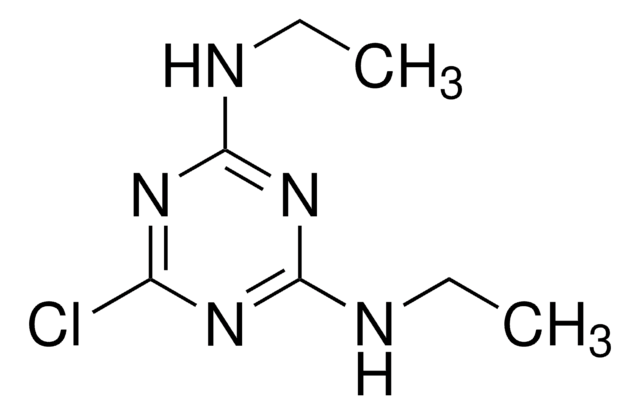Wichtige Dokumente
46443
Spiroxamin
PESTANAL®, analytical standard
Synonym(e):
N-Ethyl-N-propyl-8-tert.-butyl-1,4-dioxaspiro[4.5]dec-2-ylmethylamin
About This Item
Empfohlene Produkte
Qualität
analytical standard
Qualitätsniveau
Beschreibung
mixture of diastereomers
Produktlinie
PESTANAL®
Haltbarkeit
limited shelf life, expiry date on the label
Methode(n)
HPLC: suitable
gas chromatography (GC): suitable
Anwendung(en)
agriculture
environmental
Format
neat
SMILES String
CCCN(CC)CC1COC2(CCC(CC2)C(C)(C)C)O1
InChI
1S/C18H35NO2/c1-6-12-19(7-2)13-16-14-20-18(21-16)10-8-15(9-11-18)17(3,4)5/h15-16H,6-14H2,1-5H3
InChIKey
PUYXTUJWRLOUCW-UHFFFAOYSA-N
Suchen Sie nach ähnlichen Produkten? Aufrufen Leitfaden zum Produktvergleich
Verwandte Kategorien
Allgemeine Beschreibung
Anwendung
Rechtliche Hinweise
Sie haben nicht das passende Produkt gefunden?
Probieren Sie unser Produkt-Auswahlhilfe. aus.
Signalwort
Warning
Gefahreneinstufungen
Acute Tox. 4 Dermal - Acute Tox. 4 Inhalation - Acute Tox. 4 Oral - Aquatic Acute 1 - Aquatic Chronic 1 - Repr. 2 - Skin Irrit. 2 - Skin Sens. 1 - STOT RE 2
Zielorgane
Eyes
Lagerklassenschlüssel
10 - Combustible liquids
WGK
WGK 3
Flammpunkt (°F)
296.6 °F
Flammpunkt (°C)
147 °C
Persönliche Schutzausrüstung
Eyeshields, Faceshields, Gloves, type ABEK (EN14387) respirator filter
Hier finden Sie alle aktuellen Versionen:
Analysenzertifikate (COA)
Die passende Version wird nicht angezeigt?
Wenn Sie eine bestimmte Version benötigen, können Sie anhand der Lot- oder Chargennummer nach einem spezifischen Zertifikat suchen.
Besitzen Sie dieses Produkt bereits?
In der Dokumentenbibliothek finden Sie die Dokumentation zu den Produkten, die Sie kürzlich erworben haben.
Unser Team von Wissenschaftlern verfügt über Erfahrung in allen Forschungsbereichen einschließlich Life Science, Materialwissenschaften, chemischer Synthese, Chromatographie, Analytik und vielen mehr..
Setzen Sie sich mit dem technischen Dienst in Verbindung.











